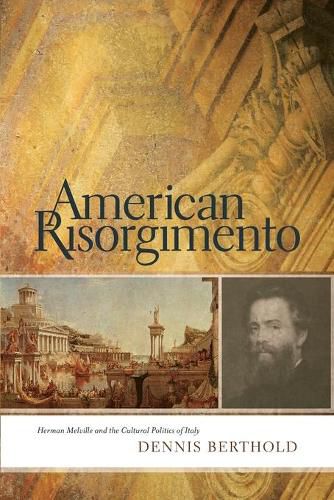Readings Newsletter
Become a Readings Member to make your shopping experience even easier.
Sign in or sign up for free!
You’re not far away from qualifying for FREE standard shipping within Australia
You’ve qualified for FREE standard shipping within Australia
The cart is loading…






This title is printed to order. This book may have been self-published. If so, we cannot guarantee the quality of the content. In the main most books will have gone through the editing process however some may not. We therefore suggest that you be aware of this before ordering this book. If in doubt check either the author or publisher’s details as we are unable to accept any returns unless they are faulty. Please contact us if you have any questions.
Although Herman Melville is typically considered one of America’s earliest cosmopolitan writers, scholarship has focused primarily on his involvement with the South Seas, England, and the Holy Land. In American Risorgimento: Herman Melville and the Cultural Politics of Italy, Dennis Berthold extends Melville’s transnational vision both geographically and historically by examining his many references to Italy and Rome in the context of the Risorgimento, Italy’s long quest for independence and political unity. Melville’s contemporaries, notably Margaret Fuller and Henry T. Tuckerman, recognized the similarities between the Risorgimento and America’s struggle for national identity, and the influx of exiles from the failed Italian revolutions of 1820 and 1831 made Melville’s New York a hotbed of Risorgimento sympathies. Literary and political expostulations on Italy’s plight combined to create a distinctively American view of the Risorgimento that Melville elaborated in his fiction through allusions, characterizations, and direct commentary on Roman history, Dante, Machiavelli, Pope Pius IX, and Giuseppe Mazzini. Melville followed the unfolding drama of Italian nationalism more closely than any other major American writer and found in it tropes and themes that fueled his turn to poetry, particularly after his visit to Italy in 1857. The Civil War, a crisis for American nationalism as urgent and profound as the Risorgimento, reinforced the symbolic parallels between the United States and Italy and led Melville to meditate on Giuseppe Garibaldi and other Italian patriots in one of his longest poems. Melville’s literary appropriations of Italian history, art, and politics demonstrate that transnational cultural exchanges are not confined to later American writing but originate with the country’s earliest authors and their recognition that any national literature worthy of the name must incorporate a broad international frame of reference. Dennis Berthold is professor of English at Texas A&M University, College Station.
$9.00 standard shipping within Australia
FREE standard shipping within Australia for orders over $100.00
Express & International shipping calculated at checkout
This title is printed to order. This book may have been self-published. If so, we cannot guarantee the quality of the content. In the main most books will have gone through the editing process however some may not. We therefore suggest that you be aware of this before ordering this book. If in doubt check either the author or publisher’s details as we are unable to accept any returns unless they are faulty. Please contact us if you have any questions.
Although Herman Melville is typically considered one of America’s earliest cosmopolitan writers, scholarship has focused primarily on his involvement with the South Seas, England, and the Holy Land. In American Risorgimento: Herman Melville and the Cultural Politics of Italy, Dennis Berthold extends Melville’s transnational vision both geographically and historically by examining his many references to Italy and Rome in the context of the Risorgimento, Italy’s long quest for independence and political unity. Melville’s contemporaries, notably Margaret Fuller and Henry T. Tuckerman, recognized the similarities between the Risorgimento and America’s struggle for national identity, and the influx of exiles from the failed Italian revolutions of 1820 and 1831 made Melville’s New York a hotbed of Risorgimento sympathies. Literary and political expostulations on Italy’s plight combined to create a distinctively American view of the Risorgimento that Melville elaborated in his fiction through allusions, characterizations, and direct commentary on Roman history, Dante, Machiavelli, Pope Pius IX, and Giuseppe Mazzini. Melville followed the unfolding drama of Italian nationalism more closely than any other major American writer and found in it tropes and themes that fueled his turn to poetry, particularly after his visit to Italy in 1857. The Civil War, a crisis for American nationalism as urgent and profound as the Risorgimento, reinforced the symbolic parallels between the United States and Italy and led Melville to meditate on Giuseppe Garibaldi and other Italian patriots in one of his longest poems. Melville’s literary appropriations of Italian history, art, and politics demonstrate that transnational cultural exchanges are not confined to later American writing but originate with the country’s earliest authors and their recognition that any national literature worthy of the name must incorporate a broad international frame of reference. Dennis Berthold is professor of English at Texas A&M University, College Station.